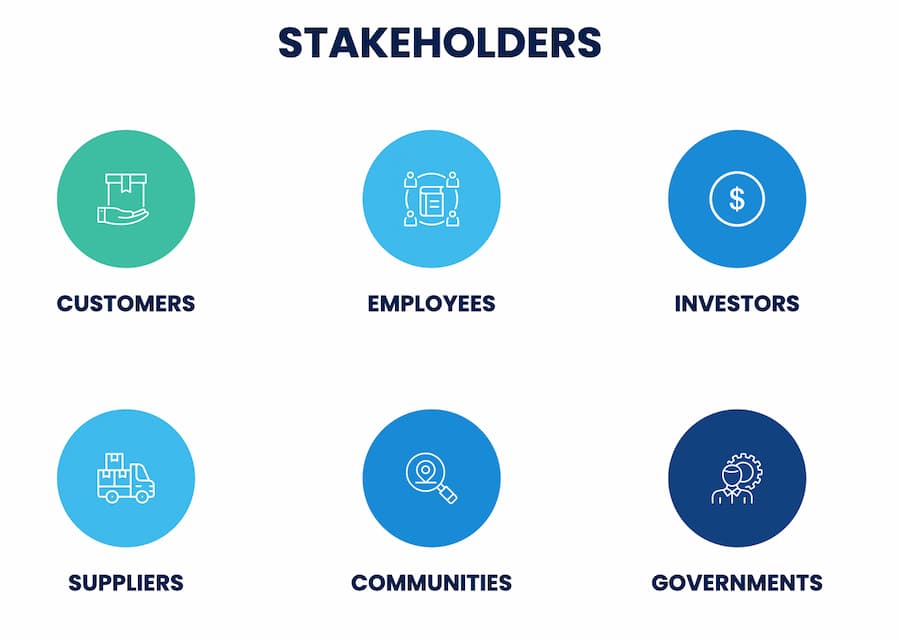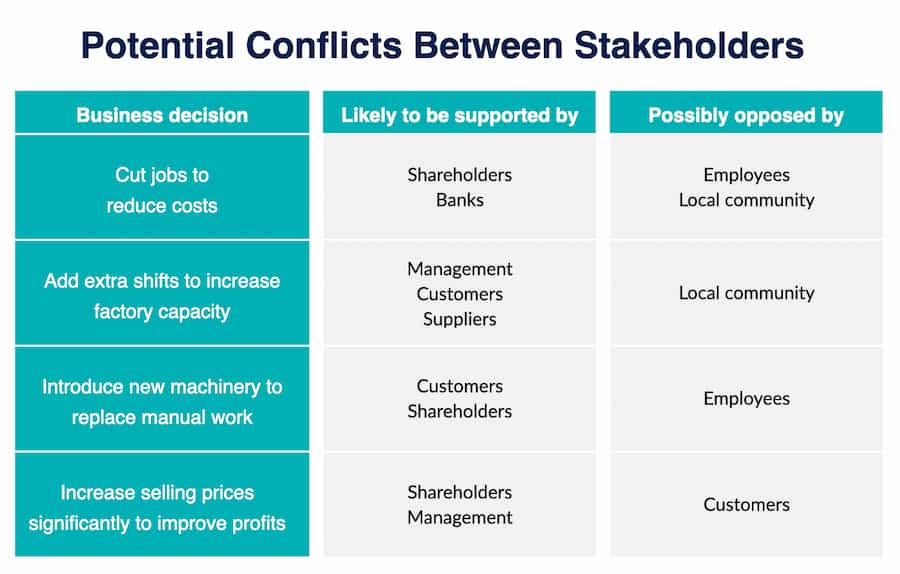Brand Stakeholders – Who They Are and How to Interact With Them
Highlights:
- Brand stakeholders are any individual or group interested in your company’s outcomes.
- Understanding what each stakeholder needs and how to cater to them can help your business succeed.
- Overlooking a stakeholder might mean overlooking a business opportunity.
- The various stakeholders can have different (and sometimes conflicting) interests, so sometimes, a company must make tradeoffs to please them all.
- Stakeholders, whether internal or external, can strongly affect reputation.
What Are Stakeholders?
Brand stakeholders are any individual or group with an interest in your company’s outcomes. Taking stock of your main stakeholders can help you understand what you’re doing to serve them and how best to communicate with them.
If you’re unaware of a stakeholder or unsure of their needs, you might overlook them in your branding and reputation management efforts. People are the most important aspect of any successful business, and stakeholders encapsulate the people who make your business what it is.
We’ll walk through a company’s many stakeholders and how you should interact with each to engender the best results and strengthen your corporate reputation.
List of Brand Stakeholders
Most companies have many types of stakeholders. The most common are listed below.
1. Employees
Individuals who work for the company, either full-time, part-time or on a contractual basis. They play a crucial role in the company’s operations and are deeply affected by its policies, culture, and financial health.
2. Consumers/Customers
Individuals or entities that purchase or use the brand’s products or services. Their perceptions, feedback, and loyalty are vital for the brand’s success and growth.
3. Leadership Team
The group of senior executives and directors is responsible for making strategic decisions for the company. Their vision and leadership style influence the company’s direction, culture, and overall success.
4. Investors/Shareholders
Individuals or entities that own shares or have invested capital in the company. They are interested in the company’s financial performance and expect returns on their investment.
5. Business Partners
Other companies or individuals that have a mutual agreement with the brand for joint ventures, collaborations, or other partnerships. Their support can influence the brand’s reach, resources, and reputation.
6. The Media
Outlets and journalists who report on the company’s news, achievements, or challenges. Their portrayal can influence public perception and brand reputation.
7. Suppliers/Vendors
Companies or individuals that provide the brand with necessary goods, services, or raw materials. Their performance, reliability, and terms impact the brand’s operations and product quality.
8. Competitors
Other businesses in the same industry vying for the same customers or market share. While they pose a challenge, they also drive innovation and market growth.
9. Your Company’s Community
The local community or region where the company operates. This includes local residents, businesses, and institutions that can be affected by the company’s operations or can influence its reputation.
10. Governments
Local, state, or national governing bodies create regulations, policies, and laws that the company must adhere to. Their decisions can impact the operational, legal, and financial aspects of the business.
11. Prospective Customers
Potential future consumers or clients who may be interested in the brand’s offerings. Their perceptions and decisions can influence future sales and growth.
12. Prospective Employees
Individuals who might consider joining the company in the future. Their perceptions about the company’s culture, benefits, and growth opportunities can affect talent acquisition and retention.
13. Prospective Vendors
Potential suppliers or service providers who might work with the company in the future. Their offerings, terms, and collaborations can affect the brand’s operations and product/service quality.
Key considerations for stakeholders
Most likely, you will struggle to please all stakeholders at all times. Sometimes, that means making tradeoffs to accommodate different stakeholders at different times.
Why are Stakeholders Important?
A business without stakeholders is not a business.
Stakeholders play an indispensable role in the overall health, growth, and sustainability of a company. They encompass a broad spectrum of individuals, groups, and organizations that have a vested interest in the company’s actions, decisions, and performance. Their importance stems from the intricate web of relationships and dependencies that exist between the company and its ecosystem.
For instance, employees are the backbone of any organization. Their skills, dedication, and morale directly influence the company’s productivity, innovation, and service quality. A motivated and satisfied workforce can drive a company to new heights, whereas disgruntled employees can significantly harm its reputation and customer relations. By ensuring fair compensation, conducive working conditions, and opportunities for professional growth, companies not only retain talent but also foster a culture of excellence and loyalty.
Consumers and customers are the lifeline of any business. Their purchasing decisions, loyalty, and feedback shape the company’s revenue trajectory and market positioning. Ignoring their needs or grievances can lead to declining sales, negative reviews, and loss of market share. Companies like Apple have thrived by continuously understanding and innovating based on customer needs, leading to high brand loyalty and repeat business.
Investors and shareholders provide the necessary capital for businesses to grow, innovate, and expand. Keeping them informed and assured about the company’s financial health and growth prospects is essential. When Tesla, for example, delivers on its promises and demonstrates potential for future growth, its stock value increases, benefiting its shareholders.
On the other hand, suppliers and vendors play a pivotal role in a company’s supply chain. Ensuring timely payments, transparent communication, and collaborative problem-solving fosters trust and reliability. For instance, companies in the automobile industry, such as Toyota, rely heavily on timely delivery of quality parts from their suppliers. Disruptions or quality issues can significantly impact production lines and, ultimately, customer satisfaction.
The local community and governments are also crucial stakeholders. Companies that engage in sustainable practices, contribute to local economies and comply with regulations foster goodwill and avoid costly legal entanglements. Tech companies in Silicon Valley, for instance, often engage in community development projects, ensuring they give back to the community they operate within.
In essence, every stakeholder offers a unique perspective and value to the company. By understanding, respecting, and addressing the needs and concerns of each stakeholder group, companies can build robust, sustainable, and mutually beneficial relationships that drive long-term success.
References Related to Stakeholders
- “What Are Stakeholders and Why Are They Important?” by the Harvard Business Review https://www.projectmanagement.ie/blog/stakeholders/
- “The Importance of Stakeholder Engagement in Business” by the World Economic Forum https://www.crowe.com/ie/insights/the-importance-of-stakeholder-engagement
- “The Importance of Stakeholder Management for Business Success” by the Association for Project Management https://www.ceo-review.com/why-effective-stakeholder-management-is-crucial-for-business-success/
- “Stakeholder Engagement: A Guide for Business Leaders” by the Prince of Wales’s Responsible Business Network https://www.theguardian.com/sustainable-business/stakeholder-engagement-practical-guide
- “The Importance of Stakeholders in Business Ethics” by the Business Ethics Alliance https://edubirdie.com/examples/the-importance-of-business-ethics-among-stakeholders-employees-and-clients/
Brand stakeholders FAQs
Who are your brand stakeholders?
Most companies have 13 key stakeholders. Here’s the list: employees, consumers/customers, leadership team, investors/shareholders, business partners, the media, suppliers/vendors, competitors, your company’s community, governments, prospective customers, prospective employees, and prospective vendors.
Why are stakeholders so important?
Understanding what each stakeholder needs and how to cater to them can help your business succeed. Overlooking a stakeholder might mean overlooking a business opportunity. Consider what might happen if you only cater to your customers and not your investors. The investors might pull funding, making it challenging for you to serve your customers. Likewise, failing to consider your employees might mean high turnover rates and difficulty creating synergy in your business practices.
Is a customer a stakeholder?
Yes, customers are some of the most important stakeholders for your business. When you make changes to your business practices or products, your customers are impacted directly. Consider them carefully before making changes to your company.
About the author
Kent Campbell is the chief strategist for Reputation X, an award-winning reputation management agency based in California. Kent has over 15 years of experience with SEO reputation management, Wikipedia editing, review management, and strategy. Kent has helped celebrities, leaders, executives, and marketing professionals improve the way they are seen online. Kent writes about reputation, SEO, Wikipedia, and PR-related topics, and is an expert witness for reputation-related legal matters. You can find Kent’s biography here.
–


